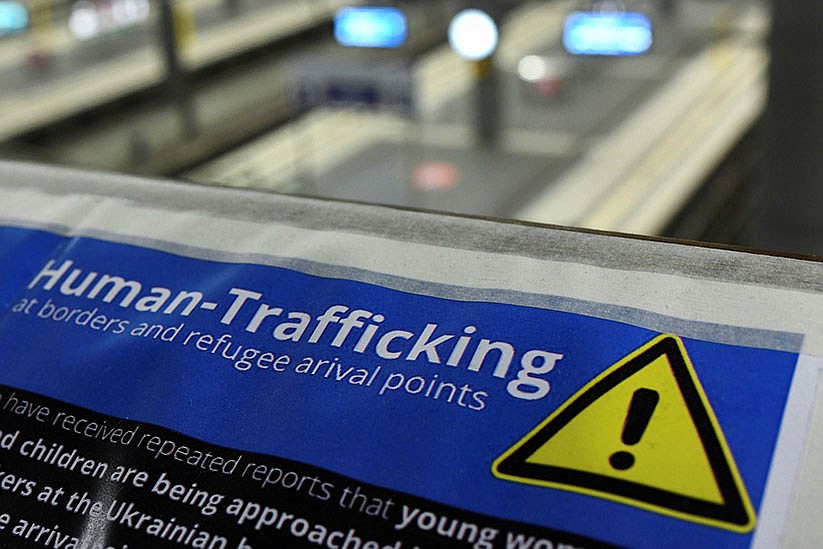Human trafficking survivors testify at congressional hearing on U.S. efforts to combat the practice
May 14, 2023 at 9:14 p.m.

Gina Cavallo told lawmakers May 12 that “force, fraud and coercion were all used by someone who pretended to be my friend, but ultimately abducted me into being trafficked.”
Cavallo said that for nearly two years, starting at age 18, she was prostituted and raped.
"I became a commodity to be used for others’ gain,” she said at a hearing of the House Foreign Affairs Subcommittee on Global Health, Global Human Rights and International Organizations chaired by Rep. Chris Smith, R-N.J.
Survivor Bella Hounakey said that despite what traffickers and abusers often tell their victims, "you are not disposable."
"You're not broken, you're not made of glass, you can heal," she said. "I invite you to have a sense of belief."
[[In-content Ad]]
The hearing came the day after the expiration of Title 42, which granted the federal government some authority to implement emergency action to prevent the spread of contagious diseases by prohibiting some migrants from entry. It was scheduled to expire in tandem with the end of the federal public health emergency declared in 2020 for COVID-19.
Smith, who authored the Trafficking Victims Protect Act of 2000, requiring an annual report on human trafficking and creating a whole-of-government initiative to combat it around the world, questioned Cindy Dyer, the U.S. Ambassador-at-Large to Monitor and Combat Trafficking in Persons, about the potential impact of the expiration of Title 42 on trafficking.
“Last year’s Trafficking in Persons Report issued by the State Department pointed out that the United States continues not to mandate human trafficking screening for all foreign national adults in immigration detention or custody, and did not screen for trafficking indicators among the people it removed,” Smith said.
“The TIP Report recommends screening all individuals in immigration detention or custody for human trafficking indicators,” said Smith. "Has the Department of Homeland Security followed through with the State Department’s recommendation? Are migrants being screened for human trafficking?”
“We agree with you that all migrants should be screened,” Dyer replied, saying she would "defer to my colleagues at DHS.”
“Certainly, it’s the perfect time to be asking the question,” she added.
A key complement of U.S. efforts, Smith said, should be the accuracy of that annual report as well as holding both the United States and other nations accountable, even if those nations are allies or if the United States is navigating complex relations with a nation on other issues.
"No fudging, no favors to nations based on other agendas," Smith said. "Friends don't let friends commit human rights abuses."
Witnesses argued that lawmakers should pass the Frederick Douglass Trafficking Victims Protection and Prevention Reauthorization Act. Smith, who authored the legislation, said he plans to reintroduce it after it stalled in the Senate. The bill would grant additional funds for resources such as shelters, mental health care, education, life skills and job training, as well as "age-appropriate programs" for trafficking prevention education.
In addition to detailing what they experienced at the hands of traffickers, survivors discussed resources that helped them after they escaped, such as skilled therapists and faith.
“I can say with certainty that all who have survived human trafficking, how they are living today, and are able to tell their stories is the embodiment of the strength of the human will and human spirit,” Hounakey said in her testimony. “It is a story of more than surviving. It is a story of the power of evil and the human spirit’s refusal to be dominated by it.”
Kate Scanlon is a national reporter for OSV News covering Washington. Follow her on Twitter @kgscanlon.
Related Stories
Wednesday, December 31, 2025
E-Editions
Events
Gina Cavallo told lawmakers May 12 that “force, fraud and coercion were all used by someone who pretended to be my friend, but ultimately abducted me into being trafficked.”
Cavallo said that for nearly two years, starting at age 18, she was prostituted and raped.
"I became a commodity to be used for others’ gain,” she said at a hearing of the House Foreign Affairs Subcommittee on Global Health, Global Human Rights and International Organizations chaired by Rep. Chris Smith, R-N.J.
Survivor Bella Hounakey said that despite what traffickers and abusers often tell their victims, "you are not disposable."
"You're not broken, you're not made of glass, you can heal," she said. "I invite you to have a sense of belief."
[[In-content Ad]]
The hearing came the day after the expiration of Title 42, which granted the federal government some authority to implement emergency action to prevent the spread of contagious diseases by prohibiting some migrants from entry. It was scheduled to expire in tandem with the end of the federal public health emergency declared in 2020 for COVID-19.
Smith, who authored the Trafficking Victims Protect Act of 2000, requiring an annual report on human trafficking and creating a whole-of-government initiative to combat it around the world, questioned Cindy Dyer, the U.S. Ambassador-at-Large to Monitor and Combat Trafficking in Persons, about the potential impact of the expiration of Title 42 on trafficking.
“Last year’s Trafficking in Persons Report issued by the State Department pointed out that the United States continues not to mandate human trafficking screening for all foreign national adults in immigration detention or custody, and did not screen for trafficking indicators among the people it removed,” Smith said.
“The TIP Report recommends screening all individuals in immigration detention or custody for human trafficking indicators,” said Smith. "Has the Department of Homeland Security followed through with the State Department’s recommendation? Are migrants being screened for human trafficking?”
“We agree with you that all migrants should be screened,” Dyer replied, saying she would "defer to my colleagues at DHS.”
“Certainly, it’s the perfect time to be asking the question,” she added.
A key complement of U.S. efforts, Smith said, should be the accuracy of that annual report as well as holding both the United States and other nations accountable, even if those nations are allies or if the United States is navigating complex relations with a nation on other issues.
"No fudging, no favors to nations based on other agendas," Smith said. "Friends don't let friends commit human rights abuses."
Witnesses argued that lawmakers should pass the Frederick Douglass Trafficking Victims Protection and Prevention Reauthorization Act. Smith, who authored the legislation, said he plans to reintroduce it after it stalled in the Senate. The bill would grant additional funds for resources such as shelters, mental health care, education, life skills and job training, as well as "age-appropriate programs" for trafficking prevention education.
In addition to detailing what they experienced at the hands of traffickers, survivors discussed resources that helped them after they escaped, such as skilled therapists and faith.
“I can say with certainty that all who have survived human trafficking, how they are living today, and are able to tell their stories is the embodiment of the strength of the human will and human spirit,” Hounakey said in her testimony. “It is a story of more than surviving. It is a story of the power of evil and the human spirit’s refusal to be dominated by it.”
Kate Scanlon is a national reporter for OSV News covering Washington. Follow her on Twitter @kgscanlon.










